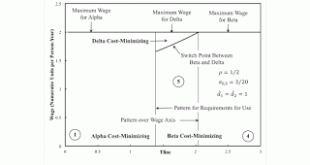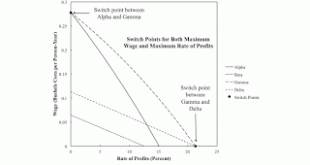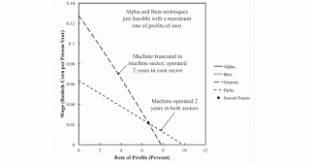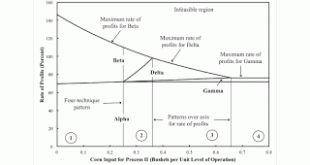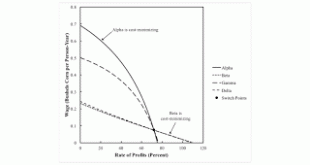You will occasionally come upon supposed refutations of Marx's theory of value that I find just ignorant. One might talk about two divers. One comes up with a handful of sand, and the other comes up with a pearl. They have put in the same labor, but their products are of quite different exchange values. Or consider the labor that goes into making a useless product, something that cannot be sold as a commodity on a market. Obviously, labor does not create value. A refutation can only be...
Read More »Visualizing The Effects Of Parameter Perturbations In Models Of Joint Production
A Temporal Path I have a new working paper. Abstract: This article illustrates the analysis of prices of production with joint production by a numerical example. The example is used to illustrate the applicability of techniques to identify and visualize qualitative changes in the choice of technique with parameter perturbations. Patterns of switch points are knife-edge or fluke cases in which any perturbation of parameters results in such a qualitative change. This article identifies a new...
Read More »Elsewhere On 2020 ‘Nobel Prize’
Edward Nik-Khan and Philip Mirowski in the New Statesman. National Public Radio's Planet Money. I should have a link to somethingn written by Glen Weyl, not just hom being interviewed.
Read More »Fluke Switch Points At Both The Maximum Wage And The Maximum Rate Of Profits
Figure 1: Wage Frontier for a Fixed Capital Example1.0 Introduction I continue to explore the simplest multisector model of the production of commodities by means of commodities in which circulating and fixed capital is used in both sectors. In previous explorations, I locate a four-technique pattern, observe recurrence of truncation, and provide an example in which truncating all machines is infeasible. I think my taxonomy of fluke switch points and methods of visualizing the effects of...
Read More »Fields Impacted By The Cambridge Capital Controversy (CCC)
Some of these should have been more impacted: Macroeconomics: Measures of Total Factor Productivity, every model with an aggregate production function, and a belief that business cycles are to be explained by sticky or rigid prices or other imperfections are all shown to be questionable. Marxist economics: Steedman's Marx after Sraffa made a splash, with many writing afterwards. Lately, I've read a bit of Riccardo Bellofiore, but a bibliography here could go on and on. Monetary...
Read More »Infeasibility Of All Machines Truncated
Figure 1: Factor Wage Curves For Feasible Techniques There are 12 coefficients that can be varied in my minimum multisector model in which production in all sectors can require both fixed and circulating capital. I do not think I am being very orderly in exploring this twelve-dimensional space. This is a fluke case in which the maximum rate of profits is zero for both the Alpha and the Beta techniques. If only new machines are used as means of production in producing new machines and in...
Read More »Recurrence Of Truncation In A Perturbation Analysis
Figure 1: Variation of Choice Of Technique with a Coefficient of Production This post continues the analysis of this example. The coefficients of production and the techniques are the same as in the linked post, except here I consider the results of varying a1, 2, the amount of corn needed as circulating capital in operating Process II at unit level. Figure 1 above shows how the choice of technique varies with this parameter. This is a two-sector model, in which new machines and corn are...
Read More »Noah Smith Claims To Have A View On The Cambridge Capital Controversy
I have been reading Noah Smith, off and on, for years. He has expressed scepticism about the obvious unrealism of macroeconomics, but I have not found him knowledgaable about heterodox economics. Noah Smith claims to have a view on the Cambridge Capital Controversy. He is asked, "Is there someplace that help me learn Sraffa? The stuff I've read from him is interesting, but is often difficult conceptually." His response is, "Just read Sraffa." And he is asked, "Which side are you on re...
Read More »A Four-Technique Pattern In A Model With Fixed Capital
Figure 1: A Wage Frontier1.0 Introduction This post presents a numberic example of a non-interlocked system with fixed capital and no superimposed joint production. This seems to be the minimum multiple-sector model: Of the production of commodities by means of comodities With both circulating and fixed capital, In which the fixed capital consists of machines of non-constant efficiency with a physical lifetime of more than one period. This is a step in my research agenda of exploring...
Read More »Sraffa’s PoCbMoC At 60
[embedded content]Seminar I finally watched Production of Commodities at 60. Our host and moderator is Matias Vernengo. Seminar participants are Franklin Serrano, Antonella Palumbo, and Ed Nell, who present in that order. They take questions at the end. I cannot recall who made these points; they generally agreed. But here are some I noted. Sraffa is not only about an internal critique of marginalist theory, but a setting out of an alternative theory. This is a rediscovery of the...
Read More » Robert Vienneau: Thoughts Economics
Robert Vienneau: Thoughts Economics

